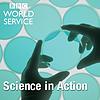
Science In Action
BBC World Service
Categories: Science & Medicine
Listen to the last episode:
Before December, the United Nations aims to have a global treaty in place covering efforts to limit global plastic production and pollution. In a paper in the journal Science, a team of scientists have used machine learning to estimate what happens by 2050 if we do nothing. But they have also found that the problem is solvable, with the right political will, and as marine ecologist Neil Nathan of UCSB points out, with surprisingly little new rules, waste could be reduced by 91%.
Machine learning this week has also helped in the creation of Evo, a tool that has created a sort of chat-GPT for the language of life, DNA. Patrick Hsu, of the University of California at Berkeley is very optimistic that the power of this tool both to predict function and one day even design whole organisms is a foundational new approach.
Migratory birds navigate vast distances without GPS. It’s long been strongly suspected that they use the earth’s magnetic field to find their way, but Richard Holland of Bangor University and colleagues have found nuance in the way they do, and publish their findings in Proceedings of the Royal Society B this week. Using electromagnetic cages they have fooled individual warblers into acting as if they were in Russia, whilst actually still being in Austria.
Meanwhile, Daniele Sorini, a cosmologist at Durham University has been thinking about dark energy and the possibility of our existence. In a thought experiment wondering what changing the density of dark energy would do to the likelihood of our being here to even think about it. Slightly contrary to what many reason is the fine-tuning of universal constants to allow us, as intelligent observers, to exist, Daniele and colleagues calculate that actually our observed density of dark energy is not the most likely to allow intelligent life. If there are other universes in the multiverse, most observers would think there was much more dark energy than we do. You can read up about it in the Monthly Notices of the Royal Astronomical Society, if you are an intelligent observer yourself.
Presenter: Roland Pease Producer: Alex Mansfield with Eliane Glaser Production Coordinator: Jana Bennett-Holesworth
(Image: Plastic waste issues in Philippines. Credit: Daniel Ceng/Anadolu via Getty Images)
Previous episodes
-
479 - Drastic plastic reductionsThu, 14 Nov 2024
-
478 - New ways to study coronavirusesThu, 07 Nov 2024
-
477 - Global warming strikes againThu, 31 Oct 2024
-
476 - Betelbuddy and Silk Road CitiesThu, 24 Oct 2024
-
475 - Marvels of life and deathThu, 17 Oct 2024
-
474 - Nobel convergenceThu, 10 Oct 2024
-
473 - Excesses of rainThu, 03 Oct 2024
-
472 - Historic weather extremes revealed using tree-ringsThu, 26 Sep 2024
-
471 - Flash floods in the SaharaThu, 19 Sep 2024
-
470 - A landslide-induced megatsunami in GreenlandThu, 12 Sep 2024
-
469 - Concerning viruses found in fur farmed animalsThu, 05 Sep 2024
-
468 - Wow! A mystery signal solvedThu, 29 Aug 2024
-
467 - Fisheries mismanagement uncoveredThu, 22 Aug 2024
-
466 - The spread of rabies into Cape fur sealsThu, 15 Aug 2024
-
465 - Detecting undetected bird flu casesThu, 08 Aug 2024
-
464 - Examining Nasa's new evidence for Martian lifeThu, 01 Aug 2024
-
463 - The human cost of the decline of nature’s carcass cleanersThu, 25 Jul 2024
-
462 - Destination Asteroid ApophisThu, 18 Jul 2024
-
461 - Hurricane Beryl’s trail of destructionThu, 11 Jul 2024
-
460 - Cleaner mining, cleaner batteriesThu, 04 Jul 2024
-
459 - On the road to halting HIVThu, 27 Jun 2024
-
458 - China: Scientific superpowerThu, 20 Jun 2024
-
457 - US bird flu response warningThu, 13 Jun 2024
-
456 - A humungous temporary tentacleThu, 06 Jun 2024
-
455 - Trusting AI with scienceThu, 30 May 2024
-
454 - The roots of fentanyl addictionThu, 23 May 2024
-
453 - Aurora Bore-WOW-lisThu, 16 May 2024
-
452 - Changing blood types and whale grammarThu, 09 May 2024
-
451 - Crossover infectionsThu, 02 May 2024
-
450 - An armada for asteroid Apophis?Thu, 25 Apr 2024
-
449 - Unexpected black hole in our galaxyThu, 18 Apr 2024
-
448 - Bird flu in AntarcticaThu, 11 Apr 2024
-
447 - Earthquake in TaiwanThu, 04 Apr 2024
-
446 - Star for a dayThu, 28 Mar 2024
-
445 - Out of AfricaThu, 21 Mar 2024
-
444 - Impacts of global warmingThu, 14 Mar 2024
-
443 - The first stars in the universeThu, 07 Mar 2024
-
442 - One million genomes in two dimensionsThu, 29 Feb 2024
-
441 - Largest ever covid safety studyThu, 22 Feb 2024
-
440 - Climate scientist wins defamation caseThu, 15 Feb 2024
-
439 - Particle physics v climate changeThu, 08 Feb 2024
-
438 - Unethical data gathering in ChinaThu, 01 Feb 2024
-
437 - Drilling into the pastThu, 25 Jan 2024
-
436 - Swine fever in South East AsiaThu, 18 Jan 2024
-
435 - Seeking supernovasThu, 11 Jan 2024
-
434 - Tackling tuberculosis in South AfricaThu, 04 Jan 2024
-
433 - Following in the footsteps of ancient humansThu, 28 Dec 2023
-
432 - Volcanic eruption lights up IcelandThu, 21 Dec 2023
-
431 - The science of morning sicknessThu, 14 Dec 2023
-
430 - Can carbon capture live up to its hype?Thu, 07 Dec 2023























